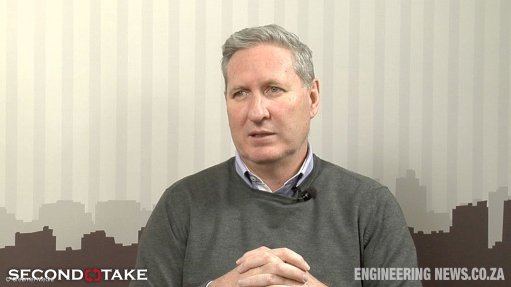Although vaccine trials are generating optimism, concerns about access are rising
Should all go well with the South African-led vaccine trial or with similar trials in the UK and Brazil, commercial lots of vaccines could be developed as early as the first quarter of next year.
However, University of the Witwatersrand (Wits) clinical infectious disease epidemiologist and vaccinologist Professor Shabir Mahdi, who is leading the trial in South Africa, has warned that this is entirely dependent on the results obtained from the trials.
He mentioned during a July 9 webinar that South Africa, and any other country, should be cautious with its expectations of vaccine trials, since only 10% of vaccines that undergo human trials eventually go into commercial use.
When asked during the World Health Organisation- (WHO-) hosted webinar on whether results could be obtained as early as November or December, Mahdi said the timing of an efficacy read-out depends on when about 42 people in the trial contract Covid-19, among the 2 000 participants.
But owing to the current high rates of infection being experienced in South Africa, the study will likely reach this threshold by the end of November, Mahdi notes.
“The more study participants contract the virus, the sooner results will be available.”
Mahdi is also a director at the Vaccines and Infectious Diseases Analytics Research Unit (VIDA).
The study, called the South African Ox1Cov-19 Vaccine VIDA-trial, started about two weeks ago and is being led by Wits researchers, in collaboration with the University of Oxford and the Oxford Jenner Institute.
This South African trial is one of about 19 other candidate trails currently being researched and tested around the world.
The objective of the South African trial is to investigate whether the ChAdOx1-Cov19 vaccine will protect against Covid-19, does not cause unacceptable side effects and if it induces satisfactory immune responses.
The 2 000 participants in South Africa will join 10 000 participants in the UK and 5 000 people in Brazil who are receiving the same vaccine in trials there.
Should positive findings arise from the trials, Mahdi says an institution in India has agreed to start manufacturing a vaccine.
However, Mahdi explains that billions of doses of the vaccine would need to be produced and, therefore, pharmaceutical manufacturers would have to be supported to scale up production, as well as to help make it affordable for developing countries.
Mahdi says a funding mechanism will need to be developed to ensure access to the vaccine in low-income countries and he advised that African countries be proactive in approaching initiatives for access to the vaccine, such as those being coordinated by public-private global health partnership Gavi, which improves access to new vaccines globally in the poorest countries.
In the meantime, he advised that the focus must remain on non-pharmaceutical interventions to curb the spread of Covid-19.
WHO regional director for Africa Matshidiso Moeti said during the webinar that, by participating in the trials, South Africa, as an African country, can help to ensure equitable access for other African countries once a vaccine ends up being viable to lessen the severity of, or prohibit the infection, of Covid-19.
“It is important to do clinical trials in Africa, since people’s makeup across ethnic groups might be different, and this way we get more relevant information about how the vaccine behaves and how people in Africa react to this product.”
She affirmed that the WHO would also speed up equitable access to Covid-19 vaccines, just as it had done with testing and diagnostics.
Moeti noted that there remain logistical barriers in every country that will have to be overcome for effective access to the vaccine.
“Countries can take steps now to strengthen health systems for vaccine delivery, including mobilising financial resources, strengthening regulatory systems for distribution and enhancing outreach services.”
Moreover, she stated that after having established the efficacy and safety of a vaccine, the world needs to establish the capacity to produce the billions of doses needed to deal with the pandemic. There is some pharmaceutical production capacity in Senegal, which has produced yellow fever vaccines for some time, as well as in Morocco, Algeria and South Africa.
This while Egypt has some capacity to manufacture vaccines and Ethiopia is in the process of re-establishing its medicinal manufacturing capacity.
Uganda Virus Research Institute executive director Professor Pontiano Kaleebu remarked that Uganda is preparing for Covid-19 vaccine activities, not only for the development of a vaccine, but also candidate vaccines that can be tested in the country.
He expressed confidence that a Covid-19 vaccine could arise early, unlike the years it had taken to trial human immunodeficiency (HIV) and Ebola vaccines, owing to the high recovery rate that Covid-19 has shown.
Keleebu further said that everyone is concerned about access to a vaccine once it is developed and access in good time as well. “It will need collaboration between funders, manufacturers and governments, among others. Nobody is safe anywhere in the world, unless everyone is safe of Covid-19.
“It is in everyone’s interest to develop an accessible vaccine system.”
TECHNICAL BACKGROUND
According to release by the South African Medical Research Council, the technical name of the vaccine is ChAdOx1 nCoV-19, as it is made from a virus called ChAdOx1, which is a weakened and non-replicating version of a common cold virus (adenovirus). The vaccine has been engineered to express the SARS-CoV-2 spike protein.
The vaccine was developed at the Oxford Jenner Institute and is currently on trial in the UK, where over 4 000 participants are already enrolled into the clinical trial and enrolment of an additional 10 000 participants is planned.
The vaccine being used in the South African trial is the same as that being used in the UK and Brazil.
The vaccine was made by adding genetic material – called spike glycoprotein – that is expressed on the surface of SARS-CoV-2 to the ChAdOx1 virus.
This spike glycoprotein is usually found on the surface of the novel coronavirus and is what gives the coronavirus its distinct spiky appearance.
These spikes play an essential role in laying a path for infection by the coronavirus. The virus that causes Covid-19 uses this spike protein to bind to ACE2 receptors on human cells.
ACE2 is a protein on the surface of many cell types. It is an enzyme that generates small proteins that then go on to regulate functions in the cell. In this way, the virus gains entry to the cells in the human body and causes Covid-19 infection.
Researchers have shown that antibodies produced against sections of the spike protein after natural infection are able to kill the virus when tested in the laboratory.
By vaccinating volunteers with ChAdOx1 nCoV-19, scientists hope to make the human body recognise and develop an immune response – develop antibodies – to the spike glycoprotein that will help stop the SARS-CoV-2 virus from entering human cells and causing Covid-19.
Comments
Press Office
Announcements
What's On
Subscribe to improve your user experience...
Option 1 (equivalent of R125 a month):
Receive a weekly copy of Creamer Media's Engineering News & Mining Weekly magazine
(print copy for those in South Africa and e-magazine for those outside of South Africa)
Receive daily email newsletters
Access to full search results
Access archive of magazine back copies
Access to Projects in Progress
Access to ONE Research Report of your choice in PDF format
Option 2 (equivalent of R375 a month):
All benefits from Option 1
PLUS
Access to Creamer Media's Research Channel Africa for ALL Research Reports, in PDF format, on various industrial and mining sectors
including Electricity; Water; Energy Transition; Hydrogen; Roads, Rail and Ports; Coal; Gold; Platinum; Battery Metals; etc.
Already a subscriber?
Forgotten your password?
Receive weekly copy of Creamer Media's Engineering News & Mining Weekly magazine (print copy for those in South Africa and e-magazine for those outside of South Africa)
➕
Recieve daily email newsletters
➕
Access to full search results
➕
Access archive of magazine back copies
➕
Access to Projects in Progress
➕
Access to ONE Research Report of your choice in PDF format
RESEARCH CHANNEL AFRICA
R4500 (equivalent of R375 a month)
SUBSCRIBEAll benefits from Option 1
➕
Access to Creamer Media's Research Channel Africa for ALL Research Reports on various industrial and mining sectors, in PDF format, including on:
Electricity
➕
Water
➕
Energy Transition
➕
Hydrogen
➕
Roads, Rail and Ports
➕
Coal
➕
Gold
➕
Platinum
➕
Battery Metals
➕
etc.
Receive all benefits from Option 1 or Option 2 delivered to numerous people at your company
➕
Multiple User names and Passwords for simultaneous log-ins
➕
Intranet integration access to all in your organisation

















